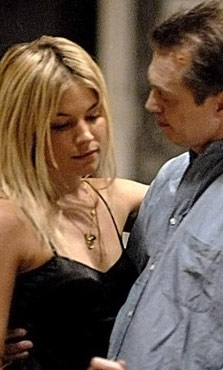
Whenever a movie features mismatched personalities colliding unexpectedly, the outcome is almost always the same, no matter how often or how violently the characters’ personalities collide with each other: our common human traits—yawn—stand in optimistic relief—yawn—to our differences. “Before Sunrise” used the model for romance. “Enemy Mine” for sci-fi. “Planes, Trains and Autombiles” for comedy. Some use larger groups of strangers for social or political commentary, like “Get On The Bus” or Paul Haggis’ “Crash”. Besides the Tinseltown sameness of this tiresomely facile worldview, what further marks this shopworn cinema trope is that these films are often used as thin pretexts for acting workshops. It’s the dare of the two-man play translated from stage to screen. Actors give it their all in the attempt to show off their “craft”, “bringing characters to life”, and the results bore us far more often than they excite or enlighten.
Steve Buscemi’s spin on this familiar story starts off hitting all these notes. Oil-and-water personality mix? Check. Last-minute, almost accidental meeting? Check. First impressions horrible? Check. Gradual warming-up period interspersed with spirited quarreling? Check. “The Interview” moves along its track smoothly and untroublingly, and while Buscemi and Sienna Miller do an admirable job playing off one another, revealing bits of themselves in feints, decoys, and other entertaining strategems, there’s a creeping suspicion halfway through this evenly paced set-piece that the emotional trench-trawling to come will be nothing more than a pedestrian exercise in the build-up to the Heart-Rending Monologue In Which All Closets Yield Up Their Skeletons. As soon as Buscemi’s haggard journalist Pierre pauses significantly before telling Miller’s starlet Katya that he doesn’t have a child, it’s on. The full revelation of his sordid past is a fait accompli. The only doubt is whether or not it will arrive post-coitus or not.
Something marvelous occurs at the end of “The Interview”, however. Buscemi has created one of those rare stories in which the direction of the film is reversed in the last frame of the film. The ending is a surprisingly sharp sucker-punch, with Pierre’s tattered weaknesses laid bare in a way that disallows any shred of sympathy for him that may have lasted to that point. In a quick-change burst of energy and animation recalling nothing so much as Verbal Kint/Kaiser Soze’s suddenly healed club foot, Pierre reverts to type, crushing several illusions which Buscemi takes pains to set running in our minds throughout the film. He appears to be exactly the man Katya thought him to be, and for her part the young ingenue looks exactly like the spoiled, self-indulgent celebrity she appears to be when we’re introduced to her wanly urging the maitre’d at her neighborhood bistro to move a couple to free up her favorite table. “The Interview” gleams with toughness at the end, reveling in its witty portrayal of two habitual liars doing what they do best. Buscemi explores the overlit world of tabloids not to show us the lack of humanity in that empty world of plastic fakeness but to show that humanity really is present—present in all its pathetic deformities.
The film’s political dimension, which initially appears to exist as a subplot providing texture and depth to the plight of Pierre’s world-weary writer, turns out to be far more important. This shouldn’t be surprising, as “The Interview” is based on Theo Van Gogh’s 2003 film of the same name. Most viewers will guess that Pierre will have shame of his own to hide, humbling him into moral equivalence with Katya, but few will guess the dire betrayal of his profession of which he is guilty. In a wonderful two-pronged attack, Buscemi’s movie forces us to question our lazy belief in the integrity of contemporary political journalism while at the same time rubbing our noses in our foolish belief that despite all appearances to the contrary celebrities really are more than the vapid, one-dimensional people they seem to be. The humor of the story comes from the ways in which the readymade assumptions about Buscemi prove false, but equally funny is how our similar assumptions about Katya prove true. Pierre’s humiliating turnabout resembles ours. Buscemi’s dark satire is a memorable pinprick to the inflated balloon of smugness on the left, yet Pierre’s problem isn’t that he’s a liberal. It’s much, much worse: he’s only human. |